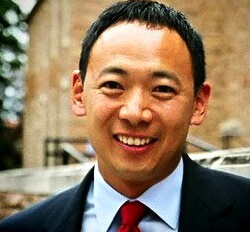- February 18, 2014
- By Lauren Brown
Was your Valentine’s Day a dud? A new book by Maryland researcher Ty Tashiro might explain why.
In “The Science of Happily Ever After: What Really Matters in the Quest for Enduring Love,” the affiliate research faculty member in Maryland’s Center for Addictions, Personality and Emotions Research (CAPER) distills hundreds of studies on relationships to conclude that many people pick their partners without considering the traits that truly matter to them.
Tashiro, who also writes “The Science of Love" for the Discovery Network's Fit and Health Channel, credits a Maryland student with giving him the idea for the book. He was teaching a psychology class called “Interpersonal Relationships” in 2006 when a sophomore named Meagan asked, “Let’s imagine you are single and looking for Mr. Right when a fairy godmother appears and grants one wish for your love life. What would be the best way to spend that wish so you live happily ever after?”

Tashiro, who shares this and other personal anecdotes in the book, responded, “The best thing to wish for would be a crystal ball.”
He soon realized her question deserved a less glib response, which led him to explore the recent bounty of research on how the personality traits, values and interests of partners could predict a relationship’s success—and to apply those theories in a practical way.
He estimates that no more than a third of all couples have found long-lasting love. As for the rest, the divorce rate hovers around 50 percent, and he says another 10 to 15 percent are permanently separated, and an additional 7 percent are chronically unhappy but remain married.
The reason unhappiness abounds, he writes, is too many people are asking for too much in their partners, making it mathematically impossible to find someone who has all those qualities. And they’re putting too much stock in candidates’ looks and money.
“Kissing your partner should not equal eating your veggies,” he says in an interview from his New York City home. But, he warns, people shouldn’t “try to maximize the amount of attraction or lust they can get at the expense of other characteristics that can make them happy in the long run.”
Tashiro discredits the fairy-tale (and “Twilight” series) storylines of love at first sight and the role of fate in bringing together soul mates. Instead, he shows how we all get just three wishes in choosing the traits of our ideal partner.
He offers his own step-by step method—a scientific crystal ball—for accurately predicting your romantic future by selecting the most valued personality traits, attachment styles and relationship behaviors.
And in the final chapter, he shows how the research conducted by Carl Lejuez, director of CAPER in the College of Behavioral and Social Sciences, on “behavioral activation” offers hope for people who’ve made the same romantic mistakes time and again. The treatment, which has helped people with problems such as addictions and depression, focuses on changing the behaviors that have made them unhappy.
Lejuez says it certainly can apply to selecting a good partner, especially because people often say they want to be with one kind of person, but they end up with someone very different.
“If I believe I want someone who is kind and caring, then maybe I should stop looking in bars, and I should start volunteering and look there,” he says. “It’s about putting your money where your mouth is.”
The book, published less than three weeks before Valentine’s Day, was featured in Self magazine, the (U.K.) Daily Mail, U.S. News & World Report, Slate and even the Australian version of the “Today” show. The attention has given him lots of opportunities to remind people that happy endings are a choice—not the act of a magic wand.
Tips from Dr. Ty
1. Invest in like, not lust. Lust helps people procreate, but it depreciates at a much faster rate than liking someone.
2. Recognize that “What is Beautiful is Good” is baloney. Research has found no link between physical attractiveness and relationship satisfaction.
3. Don’t overvalue money. Yes, we all want to avoid poverty. But wealth has a point of diminishing return on marital satisfaction.
4. Choose your most important traits in a partner wisely. What you see is what you get—he or she isn’t likely to change over a lifetime.
5. Nice guys (and women) should finish first. Agreeableness, or kindness, in a partner is a good indicator of long-term happiness.
